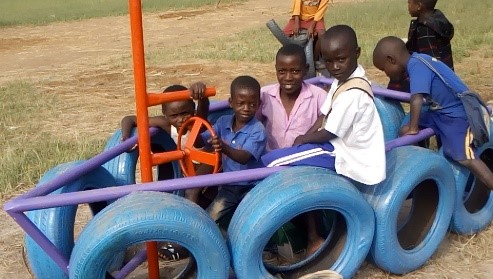System strengthening for Integrated Early Childhood Development (IECD) implementation
System strengthening for Integrated Early Childhood Development (IECD) implementation

Children in Busheka ECD Centre
Contact details
Submitted by: Jonathan Lea-Howarth, Country Director Rwanda & Uganda
Website:
https://www.righttoplay.ca/en-ca/
Social:
Introduction to the project
Country
Uganda, South-Western
Uganda, Kamwenge, Kyegegwa and Isingiro
Duration
2019-2020. Possibility of renewal.
Description
This project responds to the education needs of refugees and host communities, specifically early childhood education for children aged 3-5 years. This yields sustained and positive benefits for them.
Through system strengthening, there is increased capacity of the district to prioritise and integrate IECD initiatives into their development plans and budgets.
Partnerships have been strengthened with the key service points (i.e.: Primary schools, health facilities, other ECD centres and community groups). This has ensured that children get the required support to attain holistic development.
The inclusion of marginalised groups of people is a key project deliverable so no child is discriminated against based on their age, gender, disability or ethnicity. All are entitled to receiving quality education.
Project aims
- The project is intended to strengthen the implementation of the National Integrated Early Childhood Development (NIECD) Policy Action Plan of Uganda (2016-2020).
- The project aims to provide direct Early Childhood Development (ECD) services through ECD centres targeting mainly children between three and five years, and to coordinate additional services for comprehensive ECD delivery through supporting the ECD structure.
- The project aims to introduce/enhance parenting education and family support networks for other ECD related services. Parenting support has been enhanced through roll out the Key Family Care Practices (KFCPs). The intervention also demonstrates and advocates for inclusion of play-based learning approach in training guidelines for ECD caregivers.
Resources used
- Technical guidance from Ministry of Education and Sports
- Financial support from UNICEF
- Human Resource from RTP
Partners
- Office of the Prime Minister of Uganda
- District departments; like Departments of Planning, Education, Health through district Education Officer, IECD focal person, District planner, District Windle International Uganda
- UNHCR
How challenges were overcome
Significant challenges included lack of infrastructures. WASH facilities are inadequate and hand washing facilities are not available.
Other challenges included managing high expectations of district officials in terms of facilitations to be able to support the process.
Furthermore, there is a high number of children in all ECD centres compared to the number of care givers which affects the learning programs and daily routines as the caregivers get overwhelmed. Most centred have two caregivers. The recommend ration is 1 caregiver for 24 children. In most ECD centres the ratio is above 1/50.
Another challenge was the high rates of caregiver turnover as they leave for better job opportunities. This has affected centre operations as their replacement is not always easy.
These challenges were overcome by:
- Coordination in terms of service delivery to ensure that partners can support in areas where gaps have been identified.
- Engagements made with Government officials for a better awareness to the fact that these services strengthen their capacity to offer support to vulnerable children.
- Increased motivation of caregivers through facilitation and engagements.
Results of the Good Practice
- Fully functional IECD multi-sectoral coordination mechanisms at district, sub county and parish levels.
- ECD centres provide early stimulation, protection, health, nutrition and WASH services.
- 5,433 children access IECD services in the four refugee settlements: Kyaka 11, Oruchinga, Nakivale and Rwamwanja.
- 54 ECD caregivers trained at core PTCs; this fostered certification and their registration by the MOES.
- 222 members of Centre Management committees (CMCs) were trained, thus improving on service delivery at the centres.
- Parents were trained on Key Family Care Practices; there is increased male involvement in parenting e.g. men accompany wives for antenatal and giving them the necessary support.
Next steps
Continued collaboration and partnerships with key stakeholders including UNHCR, OPM and Development Partners, as this is critical for successful programme implementation and achieving overall goal of implementation of National IECD Policy.



